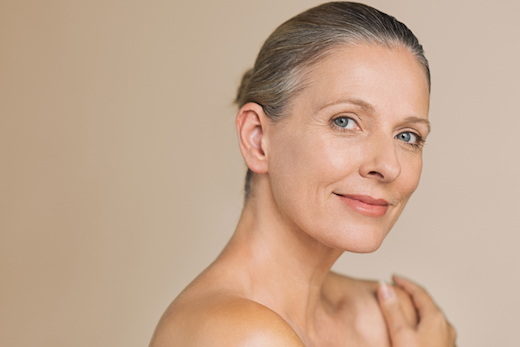Inflammaging, the combination of "inflammation" and "aging," describes the chronic, low-grade inflammation associated with many age-related diseases and the aging process. It is different from the kind of acute inflammation, which has a clear beginning and end, that happens when, for example, you get a cut or an infection. Instead, it's a constant, slow-brewing inflammatory state with no clear end that can affect the whole body and is believed to play a role in a wide range of conditions.

Inflammaging doesn't just affect the internal organs but also manifests on the skin, contributing to signs of premature skin aging such as wrinkles, fine lines, hyperpigmentation, and loss of elasticity. The skin, as the body's largest organ, is furthermore also exposed to numerous environmental stressors, including UV radiation, pollutants, and pathogens.
Over time, these factors can accelerate cellular damage, leading to the activation of the skin's innate immune response and the production of inflammatory mediators. The perpetual cycle of damage and inflammation can exacerbate skin aging and contribute to skin conditions often associated with mature skin, such as rosacea, dryness, and decreased barrier function.
Some factors that can impact inflammaging
Dietary factors:
- High Sugar Intake: Diets high in sugar, especially refined sugars such as high fructose corn syrup, can lead to increased production of advanced glycation end products (AGEs). AGEs can provoke inflammatory responses in cells. High sugar consumption can also lead to increased levels of insulin in the blood and insulin resistance, which can be pro-inflammatory.
- Trans Fats and Saturated Fats: These can promote inflammation when consumed in high amounts. A diet rich in sugars and unhealthy fats can furthermore contribute to obesity, which in and of itself can promote inflammation as the adipose (fat) tissue can produce inflammatory cytokines.
- Low Intake of Omega-3, Antioxidants and Polyphenols: Foods rich in Omega-3 fatty acids, found in fish and certain plant sources, and antioxidants and polyphenols, such as fruits, vegetables, nuts, and certain beverages like green tea, have anti-inflammatory properties. A diet lacking antioxidants and polyphenols that is high in Omega-6 can increase the risk of chronic inflammation.
Lifestyle Factors:
- Physical Inactivity: Regular exercise, apart from being beneficial for overall health and metabolic function, has anti-inflammatory effects.
- Stress and Poor Sleep: Chronic stress can lead to elevated levels of cortisol, a hormone that, when persistently high, can promote inflammation. With elevated cortisol levels, it can lead to disrupted sleep or chronic sleep issues, which in turn can further elevate inflammatory markers.
- Smoking/Alcohol Intake: Excessive drinking can be pro-inflammatory, whereas tobacco smoke contains numerous toxic and inflammation-inducing compounds that can speed up the aging process.
What you can do about it
Combating inflammaging is best done through a multifaceted approach, given that it is influenced, beyond genetics, by a combination of dietary, lifestyle, and environmental factors.
Limiting sugar and processed foods, increasing consumption of antioxidant & polyphenol-rich foods such as berries, nuts, and green tea, managing stress and prioritizing sleep with a regular sleep schedule, aiming at 7-9 hours of quality sleep per night, can go a long way.

Skincare and inflammaging
Beyond an anti-inflammatory diet, exercise, and an overall healthy lifestyle, skincare plays a pivotal role in addressing and potentially mitigating inflammaging. Antioxidant-rich and anti-inflammatory formulations such as the LXMI 33 Face Oil, containing ingredients like vitamin C, vitamin E, and vitamin B3/niacinamide (read our blog post about niacinamide here), can neutralize free radicals, which are major contributors to cellular damage and inflammation.
Moreover, plant-based ingredients such as hibiscus (abundant in the Crème du Nil daily moisturizer) can stimulate collagen production, counteracting the thinning and decreased elasticity associated with aging skin.

Additionally, maintaining a robust skin barrier with products rich in essential lipids such as the Pure Nilotica Melt, can support barrier function, reduce trans-epidermal water loss, and help the skin resist external irritants and pathogens that can exacerbate inflammation.

By adopting a proactive skincare regimen, it is possible to not only enhance the appearance of your skin but also decelerate the process of inflammaging at the cutaneous level.





